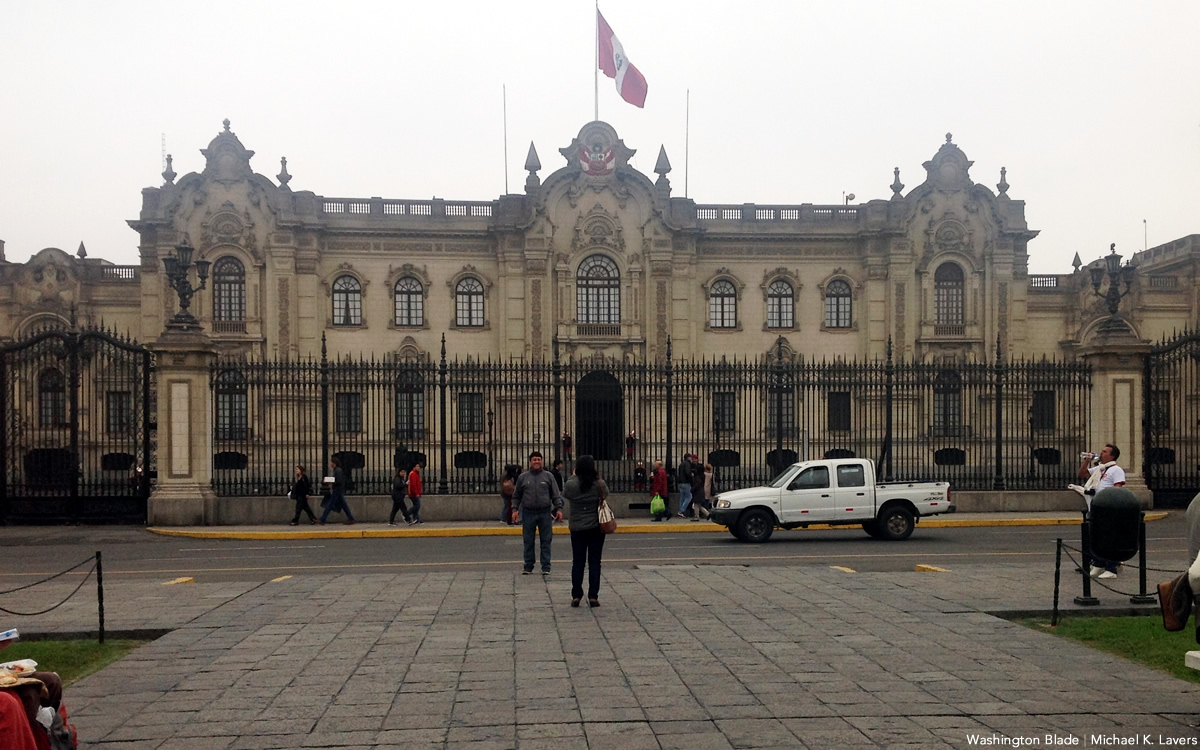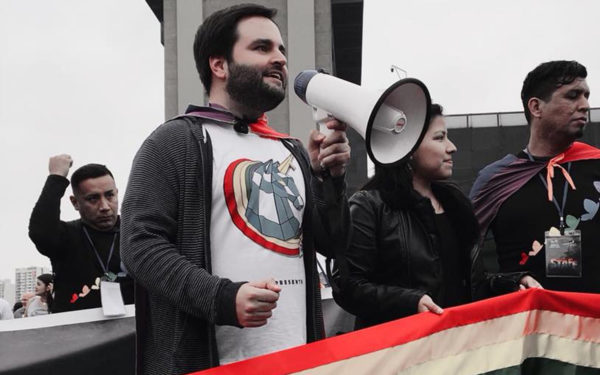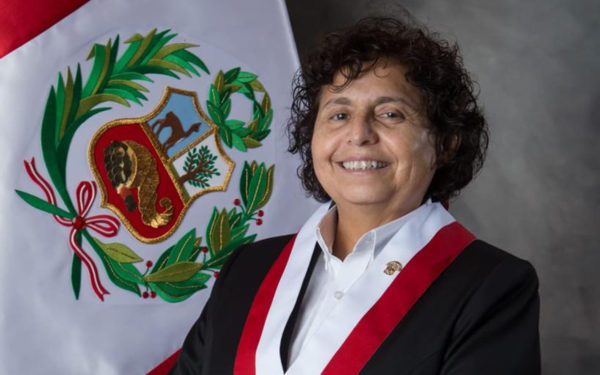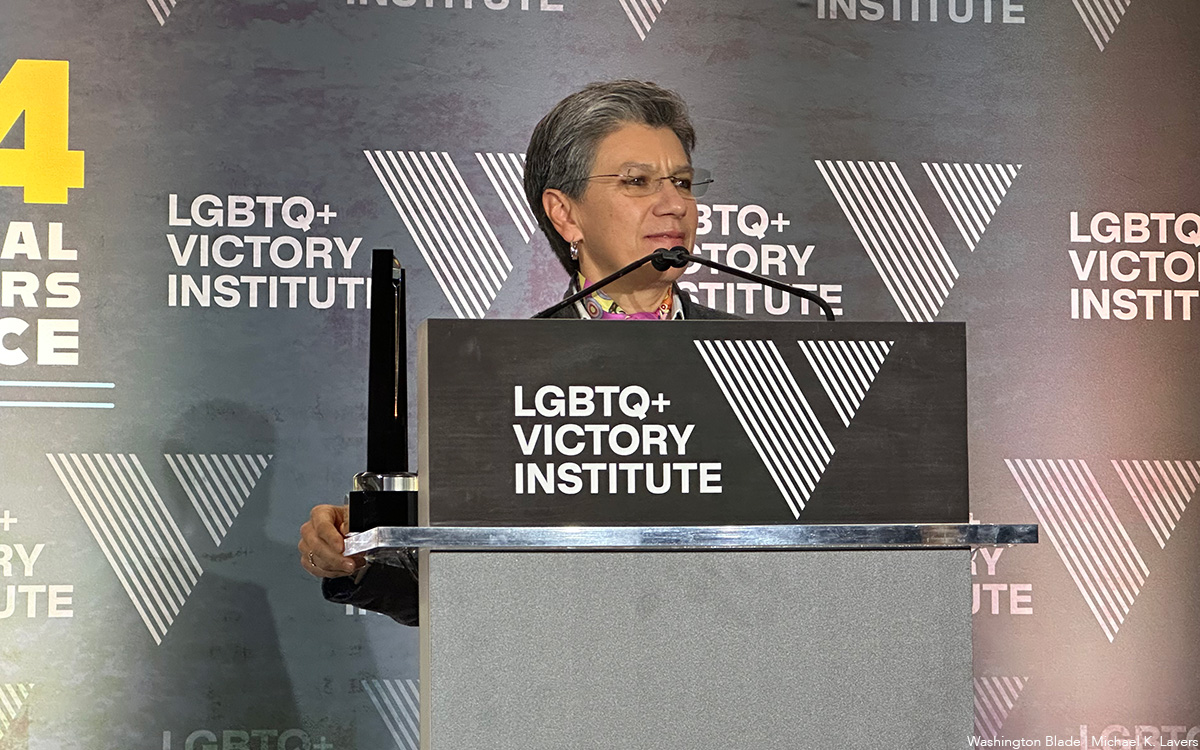South America
Peru continues to lag behind other Latin American countries on LGBTQ rights
Attempts to ‘heal homosexuality’ remain legally protected

Peru is one of the few Latin American countries without pro-LGBTQ laws, and this evident backwardness in comparison to neighboring countries translates into a lower quality of life for those who do not identify as heterosexual.
LGBTQ Peruvians are highly vulnerable because of their sexual orientation and gender identity, and they also lack a regulatory framework that recognizes and protects them. This reality makes it more difficult for them to fight for equal rights in the areas of health, education and work, among others.
So-called conversion therapy is still allowed in Peru, and attempts to “heal homosexuality” remain legally protected.
The Peruvian Ministry of Justice at the end of 2020 requested for the first time a survey that focused on the LGBTQ community. It revealed 71 percent of Peruvians considers LGBTQ people are the most discriminated group in the country.
The Inter-American Court of Human Rights in 2020 held the Peruvian state responsible for the rape and torture of Azul Rojas Marin, a transgender woman, and ordered it to provide medical, psychological and/or psychiatric treatment and to prosecute the officers who tortured her. The ruling also called on Peru to track anti-LGBTQ violence in the country and develop a national strategy to respond to it.
None of this has been complied with so far, demonstrating the state’s indifference to LGBTQ rights.
“LGBTI people are succinctly recognized in some regional or municipal ordinances at the local level, however, they have no recognition in any national legislation explicitly, which addresses their needs,” George Hale, institutional development director of Promsex, a Peruvian LGBTQ rights group, told the Washington Blade.
Jorge Apolaya, who has been organizing Pride marches in Peru for years, said that “discrimination against LGBTQ+ people in the country is associated with a heterosexist culture that continues to permeate the different spheres of society, not only in public services that should be available to all people regardless of their sexual orientation and/or gender expression or identity, but also in families whose structures continue to violate non-heterosexual people.”
Peruvian lawmakers recently passed a bill that eliminates the possibility of having comprehensive sexual education with a gender focus in schools, handing that power to parents. The country is one of the few in South America that allows it.
Most of the activists in Peru with whom the Blade spoke agree that previous governments have made no progress on LGBTQ rights, and that scenario will not improve because President Pedro Castillo, who took office last year, has publicly stated LGBTQ rights are not a priority for his administration.
Then-Congressman Carlos Bruce in 2014 came out as gay in an interview with a Peruvian newspaper. Alberto de Belaunde in 2016 became the first openly gay man elected to the Peruvian Congress.

De Belaunde tried to pass various bills that his colleagues did not support. He did, however, manage to start a public debate about the lives of LGBTQ Peruvians and responded to hate speech.
De Belaunde told the Blade that “Peru is a country with a serious problem of inequality, where not all its citizens have the same rights. The LGBTQ+ community faces a serious problem of exclusion as they do not see basic rights recognized and respected, such as the right to identity or the right to equality, and this impacts their quality of life.”
He also said the COVID-19 pandemic worsened the vulnerability of LGBTQ people, particularly trans people after former President Martín Vizcarra at one point implemented a “pico y género” rule that allowed people to leave their homes based on their gender. This regulation generated a wave of violence — mainly against trans women — in Peru.
De Belaunde did not run for re-election last year, but two LGBTQ politicians entered Congress.
Susel Paredes from the center-left Purple Party became the first openly lesbian congressman in Peru. She also received the most votes of any woman who ran for Congress.

Alejando Cavero of the right-wing Avanza País party became the second openly gay man elected to Congress.
Paredes explained to the Blade from her office in Lima, the Peruvian capital, that she is currently working to pass a marriage equality bill and another that would protect people based on their gender identity. Paredes said civil unions are unacceptable “because we are looking for full equality, not special laws for us.”
Cavero, on the other hand, has announced he will soon introduce a civil unions bill.
He is also considering the elimination of the word marriage, leaving it exclusively for the religious sphere. Paredes and some Peruvian LGBTQ activists do not support this strategy.
Paredes, however, acknowledged her expectations regarding the approval of equal marriage in this Congress have no possibilities. She therefore said she will support Cavero’s civil unions bill.
“The possibilities that equal marriage will be approved are very limited and scarce due to the composition of the and scarce due to the composition of the Congress,” emphasized Paredes. “It is a Congress that has some left-wing conservatives and some right-wing conservatives. And the Peruvian right wing is absolutely conservative, there is no modern liberal right wing.”
“I believe that the civil union bill will be approved. But for that, we have to keep pushing for equal marriage. That way, the civil union bill will be approved faster and at last LGBTQ+ families will be able to have an institutionality,” she stressed.
Paredes is currently seeking legal recognition of her 2016 marriage in the U.S.
She said she will bring her case to the Inter-American Court of Human Rights if Peru’s Constitutional Court rules against her.
Colombia
Colombia avanza hacia la igualdad para personas trans
Fue aprobado en Comisión Primera de la Cámara la Ley Integral Trans

En un hecho histórico para los derechos humanos en Colombia, la Comisión Primera de la Cámara de Representantes aprobó en primer debate el Proyecto de Ley 122 de 2024, conocido como la Ley Integral Trans, que busca garantizar la igualdad efectiva de las personas con identidades de género diversas en el país. Esta iniciativa, impulsada por más de cien organizaciones sociales defensoras de los derechos LGBTQ, congresistas de la comisión por la Diversidad y personas trans, representa un paso decisivo hacia el reconocimiento pleno de derechos para esta población históricamente marginada.
La Ley Integral Trans propone un marco normativo robusto para enfrentar la discriminación y promover la inclusión. Entre sus principales ejes se destacan el acceso a servicios de salud con enfoque diferencial, el reconocimiento de la identidad de género en todos los ámbitos de la vida, la creación de programas de empleo y educación para personas trans, así como medidas para garantizar el acceso a la justicia y la protección frente a violencias basadas en prejuicios.
Detractores hablan de ‘imposición ideológica
Sin embargo, el avance del proyecto no ha estado exento de polémicas. Algunos sectores conservadores han señalado que la iniciativa representa una “imposición ideológica”. La senadora y precandidata presidencial María Fernanda Cabal anunció públicamente que se opondrá al proyecto de Ley Integral Trans cuando llegue al Senado, argumentando que “todas las personas deben ser tratadas por igual” y que esta propuesta vulneraría un principio constitucional. Estas declaraciones anticipan un debate intenso en las próximas etapas legislativas.
El proyecto también establecelineamientos claros para que las instituciones públicas respeten el nombre y el género con los que las personas trans se identifican, en concordancia con su identidad de género, y contempla procesos de formación y sensibilización en entidades estatales. Además, impulsa políticas públicas en contextos clave como el trabajo, la educación, la cultura y el deporte, promoviendo una vida libre de discriminación y con garantías plenas de participación.
¿Qué sigue para que sea ley?
La Ley aún debe superar varios debates legislativos, incluyendo la plenaria en la Cámara y luego el paso al Senado; pero la sola aprobación en Comisión Primera ya constituye un hito en la lucha por la igualdad y la dignidad de las personas trans en Colombia. En un país donde esta población enfrenta altos niveles de exclusión, violencia y barreras estructurales, este avance legislativo renueva la esperanza de una transformación real.
Desde www.orgullolgbt.co, celebramos este logro, invitamos a unirnos en esta causa impulsándola en los círculos a los que tengamos acceso y reiteramos nuestro compromiso con la visibilidad, los derechos y la vida digna de las personas trans. La #LeyIntegralTrans bautizada “Ley Sara Millerey” en honor de la mujer trans recientemente asesinada en Bello, Antioquia (ver más aquí); no es solo una propuesta normativa: es un acto de justicia que busca asegurar condiciones reales para que todas las personas puedan vivir con libertad, seguridad y respeto por su identidad.
Colombia
Claudia López running for president of Colombia
Former Bogotá mayor married to Sen. Angélica Lozano

Former Bogotá Mayor Claudia López has announced she is running for president of Colombia.
“We begin today and we will win in a year,” she said in a social media post on June 3.
View this post on Instagram
López, 55, was a student protest movement leader, journalist, and political scientist before she entered politics. López returned to Colombia in 2013 after she earned her PhD in political science at Columbia University.
López in a speech she gave last December after the LGBTQ+ Victory Institute honored her at its annual International LGBTQ Leaders Conference in D.C. noted Juan Francisco “Kiko” Gomez, a former governor of La Guajíra, a department in northern Colombia, threatened to assassinate her because she wrote about his ties to criminal gangs.
A Bogotá judge in 2017 convicted Gómez of ordering members of a paramilitary group to kill former Barrancas Mayor Yandra Brito, her husband, and bodyguard and sentenced him to 55 years in prison.
López in 2014 returned to Colombia, and ran for the country’s Senate as a member of the center-left Green Alliance party after she recovered from breast cancer. López won after a 10-week campaign that cost $80,000.
López in 2018 was her party’s candidate to succeed then-President Juan Manuel Santos when he left office. López in 2019 became the first woman and first lesbian elected mayor of Bogotá, the Colombian capital and the country’s largest city.
López took office on Jan. 1, 2020, less than a month after she married her wife, Colombian Sen. Angélica Lozano. (López was not out when she was elected to the Senate.) López’s mayorship ended on Dec. 31, 2023. She was a 2024 Harvard University Advance Leadership Initiative fellow.
The first-round of Colombia’s presidential election will take place on May 31, 2026.
The country’s 1991 constitution prevents current President Gustavo Petro from seeking re-election.
López declared her candidacy four days before a gunman shot Sen. Miguel Uribe, a member of the opposition Democratic Center party who is seen as a probable presidential candidate, in the head during a rally in Bogotá’s Fontibón neighborhood.
She quickly condemned the shooting. López during an interview with the Washington Blade after the Victory Institute honored her called for an end to polarization in Colombia.
“We need to listen to each other again, we need to have a coffee with each other again, we need to touch each other’s skin,” she said.
López would be Colombia’s first female president if she wins. López would also become the third openly lesbian woman elected head of government — Jóhanna Sigurðardóttir was Iceland’s prime minister from 2009-2013 and Ana Brnabić was Serbia’s prime minister from 2017-2024.
Chile
Gay pharmacist’s murder sparks outrage in Chile
Francisco Albornoz’s body found in remote ravine on June 4

The latest revelations about the tragic death of Francisco Albornoz, a 21-year-old gay pharmacist whose body was found on June 4 in a remote ravine in the O’Higgins region 12 days after he disappeared, has left Chile’s LGBTQ community shocked.
The crime, which was initially surrounded by uncertainty and contradictory theories, has taken a darker and more shocking turn after prosecutors charged Christian González, an Ecuadorian doctor, and José Miguel Baeza, a Chilean chef, in connection with Albornoz’s murder. González and Baeza are in custody while authorities continue to investigate the case.
The Chilean Public Prosecutor’s Office has pointed to a premeditated “criminal plan” to murder Albornoz.
Rossana Folli, the prosecutor who is in charge of the case, says Albornoz died as a a result of traumatic encephalopathy after receiving multiple blows to the head inside an apartment in Ñuñoa, which is just outside of Santiago, the Chilean capital, early on May 24. The Prosecutor’s Office has categorically ruled out that Albornoz died of a drug overdose, as initial reports suggested.
“The fact that motivates and leads to the unfortunate death of Francisco is part of a criminal plan of the two defendants, aimed at ensuring his death and guaranteeing total impunity,” Folli told the court. “The seriousness of the facts led the judge to decree preventive detention for both defendants on the grounds that their freedom represents a danger to public safety.”
Prosecutors during a June 7 hearing that lasted almost eight hours presented conservations from the suspects’ cell phones that they say showed they planned the murder in advance.
“Here we already have one (for Albornoz.) If you bring chloroform, drugs, marijuana, etc.,” read one of the messages.
Security cameras captured the three men entering the apartment where the murder took place together.
Hours later, one of the suspects left with a suitcase and a shopping cart to transport Albornoz’s body, which had been wrapped in a sleeping bag. The route they followed to dispose of the body included a stop to buy drinks, potato chips, gloves, and a rope with which they finally descended a ravine to hide it.
Advocacy groups demand authorities investigate murder as hate crime
Although the Public Prosecutor’s Office has not yet officially classified the murder as a hate crime, LGBTQ organizations are already demanding authorities investigate this angle. Human rights groups have raised concerns over patterns of violence that affect queer people in Chile.
The Zamudio Law and other anti-discrimination laws exist. Activists, however, maintain crimes motivated by a person’s sexual orientation or gender identity are not properly prosecuted.
“This is not just a homicide, it is the cruelest expression of a society that still allows the dehumanization of LGBTQ+ people,” said a statement from Fundación Iguales, one of Chile’s main LGBTQ organizations. “We demand truth, justice, and guarantees of non-repetition.”
The Movement for Homosexual Integration and Liberation (Movilh), meanwhile, indicated that “since the first day the family contacted us, we have been in conversations with the Prosecutor’s Office so that this fatal outcome is thoroughly investigated, including the possible existence of homophobic motivations or components.”
The investigation into Albornoz’s murder continues, and the court has imposed a 90-day deadline for authorities to complete it.
-

 U.S. Supreme Court4 days ago
U.S. Supreme Court4 days agoSupreme Court upholds ACA rule that makes PrEP, other preventative care free
-

 U.S. Supreme Court4 days ago
U.S. Supreme Court4 days agoSupreme Court rules parents must have option to opt children out of LGBTQ-specific lessons
-

 District of Columbia5 days ago
District of Columbia5 days agoMan sentenced to 15 years in prison for drug deal that killed two DC gay men
-

 Federal Government5 days ago
Federal Government5 days agoWhite House finds Calif. violated Title IX by allowing trans athletes in school sports












